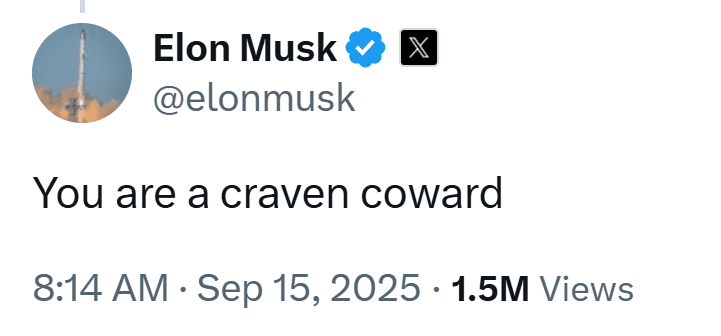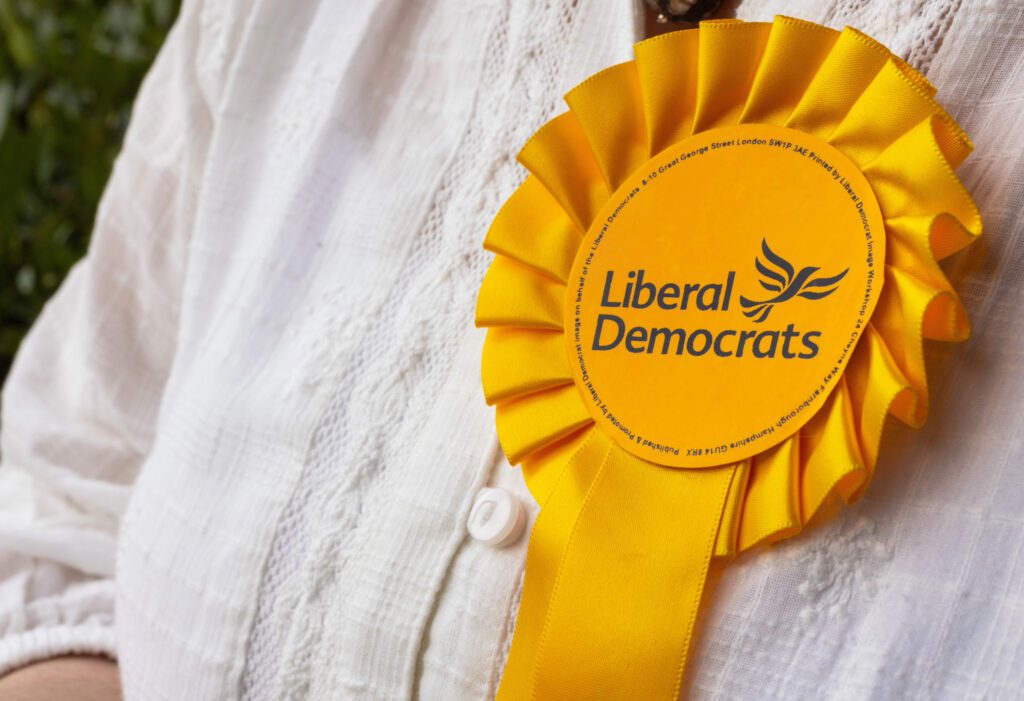The recent Lib Dem Conference in Brighton offered insight into Westminster’s third-largest party, their leader Sir Ed Davey, and their ambitions for Britain’s future. From Davey’s high-profile clash with Elon Musk to the Liberal Democrats’ unapologetically pro-EU stance and bold vision for a clean energy revolution, the conference showcased a party eager to sharpen its identity and influence the national debate. Here’s what we learned from the conference:
Foreign Policy
The topic of foreign policy at the conference was dominated by 3 subjects: the European Union, Elon Musk, Donald Trump.
On Monday morning, conference delegates passed a detailed motion calling on the government to develop stronger ties with the EU, highlighting the party’s long-term goal of reversing Brexit and seeing the UK ‘take its rightful place back at the heart of Europe.’
Regarding the world’s richest man, Sir Ed Davey has been highly critical of Elon Musk ever since he appeared via video link at a Tommy Robinson rally earlier this month, where he called for a ‘dissolution of parliament’ and told spectators that they must either ‘fight back’ or ‘die.’ In response to this, Davey wrote a letter to Prime Minister Keir Starmer asking him to publicly condemn Musk’s comments, to which Musk responded by calling the Lib Dem leader a ‘coward.’

Davey’s criticism of Musk continued at the conference; speaking to the BBC’s Laura Kuennsberg, Davey said that Musk is ‘committing crimes’ by allowing certain graphic content to remain on his X platform, whilst during an interview with Sky News he called for him to be prosecuted under the new Online Safety Act and arrested if he ever comes to the UK.
Musk is not the only major figure in US politics to have caught Davey’s wrath during the conference, as he accused President Donald Trump of having an ‘anti-science agenda,’ after the US government cut funding for biomedical research in February – a decision that Davey claimed was motivated by ‘cruelty and stupidity.’
However, when asked by PoliticsUK whether he would rather live on a desert island with Trump, Musk, or Reform UK leader Nigel Farage, Davey chose the American President, albeit not necessarily for the right reasons; ‘Trump is the oldest and so he wouldn’t last very long.’
Additionally, during his keynote speech at the end of the conference, Davey warned his party not to allow Reform UK leader Nigel Farage to turn Britain into Trump’s America.
The Threat of Reform
The rise of Farage’s party was another topic on everyone’s minds at the conference. On Monday afternoon, a panel of 3 senior Lib Dem councillors discussed the party’s new Reform Watch initiative, a scheme founded by Ed Davey which encourages grassroots activists and councillors to report back to the party on the activities of Reform in their local area.
Whilst they were highly critical of Reform, accusing them of misleading campaigning and ‘building a record of failure’ through their councils across the country, the mood was certainly not one of fear, with the panel clearly determined, hopeful, and confident that the Lib Dems are the party best positioned to ‘tackle Reform head on.’
The panel also argued that the Lib Dems, not Reform, were the real party of patriotism; a patriotism defined by helping out your community, and ‘talking (your country) up, not talking it down,’ a sentiment that has been on display all throughout a conference where journalists were given a ‘plastic patriot’ Nigel Farage lego figure, and former leader Tim Farron called on delegates to ‘reclaim patriotism’ from the far right, whilst draped in an England flag.
Clean Energy and the Environment
Another key focus of the conference, one that has got somewhat less media coverage than others, was clean energy, climate change, and the environment.
In the conference’s policy review motion, titled ‘Leading the Way,’ the party claimed that the UK is currently on track to miss its net zero targets, that 1 in 6 animal species in Britain are at threat of extinction, and that tens of thousands of Brits are being killed by air pollution each year.
The motion also established the Lib Dems intention to lead the way to a ‘free, fair and open society,’ where ‘everyone can enjoy the benefits of (Britain’s) wonderful natural environment.’
On Sunday the conference also voted in favour of supporting the construction and development of small modular reactors and other methods of generating nuclear power, highlighting the party’s position that nuclear is the way forward when it comes to achieving net zero.
Healthcare and Life Sciences
The aforementioned ‘Leading the Way’ motion also focussed on healthcare, recognising the ‘stark and persistent regional inequalities’ in the quality of healthcare across the country, committing to working towards securing the necessary investment to close those gaps, and listed ‘improving primary healthcare’ and shifting more care out of hospitals and into communities as a key topic that parliament should be focussing on.
Furthermore, in his speech on Tuesday, Ed Davey claimed that under a Reform government the health service would cease to exist and patients would be ‘hit with crippling insurance bills,’ and invited American cancer researchers affected by Donald Trump’s previously mentioned research cuts to Britain, saying ‘if Trump won’t back this research, we will.’
Technology
Elsewhere, Science and Technology spokesperson Victoria Collins launched a new policy plan to protect children from the potential harms of social media and improve their mental health.
The plan includes a proposed ‘doomscrolling cap,’ which would limit the amount of time children can spend scrolling short-form video content to 2 hours a day, and calls for social media companies to introduce health alerts for under-18s.
Such proposals are motivated by recent polling from the party which found that 80% of parents of school-aged children surveyed report that excessive social media usage has caused negative behaviours in their children, including difficulty sleeping, arguments with family members, and loss of interest in other hobbies.
The party also voted in favour of holding a debate about the topic of digital ID cards, at a time when it is being reported that the government are considering introducing them to tackle illegal immigration. Whilst when they were in government alongside the Conservatives in 2010 the Lib Dems blocked a r proposal to introduce digital ID, during Tuesday’s speech Davey called for the party to look at the issue again, recognising that ‘times have changed’ and stating that he was impressed with the system being used in Estonia.
Furthermore, despite Davey calling for Elon Musk to be prosecuted under it, the conference passed a motion calling for reform of the Online Safety Act, demanding that it be reviewed by parliament and that regulation focusses on ‘real online harms,’ rather than ‘blocking access to politics, education, or wellbeing resources.’ The end goal of these proposals is the creation of a new ‘Digital Bill of Rights’ to protect freedom of speech, whilst simultaneously ensuring that the public is protected from genuinely harmful content.
Conclusion
Overall, the Lib Dem conference painted a picture of a party striving to balance principle with pragmatism. By doubling down on their pro-EU credentials, championing clean energy and environmental action, and calling for investment in healthcare and life sciences, the Liberal Democrats reinforced their progressive identity. At the same time, Ed Davey’s combative stance toward figures like Elon Musk and Donald Trump, and his warnings about Nigel Farage’s Reform UK, showed a readiness to engage forcefully in today’s polarised political climate. Whether their ambitions will translate into greater influence at Westminster remains to be seen, but the conference left little doubt about the Lib Dems’ determination to shape Britain’s future.

